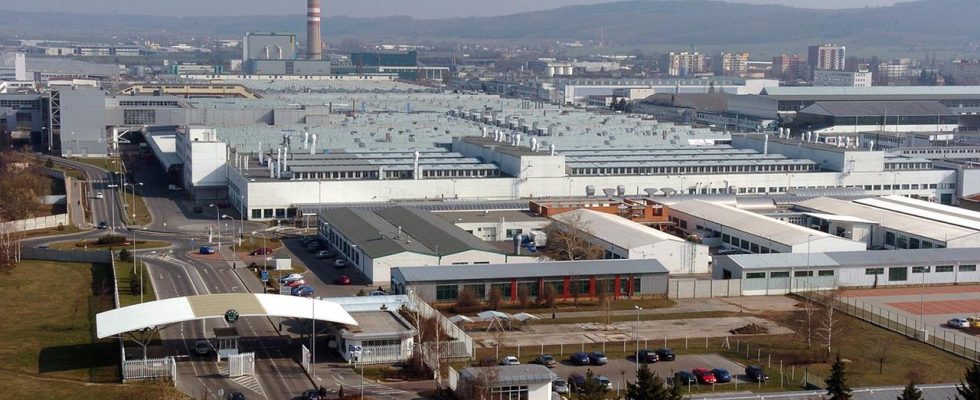The Czech Republic and Slovakia are important countries for Germany’s auto industry. And so the economies of both countries depend on the fortunes and woes of the German economy.
The newspaper “Mlada Fronta Dnes” describes the situation in the Czech Republic with a caricature: The finance minister can be seen with deep worry lines. The names of German car companies are written on his T-shirt – after all, the Czech Republic is their most important supplier country.
However, the logos have been patched up with green patches and the mobility transition is leaving its mark. It says that the economic prospects in Germany are not good. Even the Czech Republic, as the “17th federal state”, cannot expect anything good.
“Will drag us into the abyss”
“Unfortunately, foreign demand, which is very important for the Czech export economy, is deteriorating,” says Tomas Dvorak. Born in the Czech Republic, he is an economist and conducts research in London. “That’s why I described the Czech Republic as the sick man of Europe, which is actually what people usually say about Germany. That’s not looking good either and will unfortunately drag us into the abyss for some time.”
Dvorak’s analysis sparked strong reactions in the Czech Republic. The numbers actually don’t look good: Last year the Czech economy shrank by 0.4 percent – unlike its neighboring countries Poland or Austria. Only Germany stood by the Czech Republic, it is said ironically, and also shrank – by 0.3 percent.
“The primary shock was the corona pandemic, from which we were the only EU country that never really recovered,” analyzes Dvorak. “Then the energy crisis came. We are not very energy efficient. Only Bulgaria is behind us in Europe.” When it comes to inflation, however, the Czech Republic is consistently at the top. As a result, real wages have fallen sharply and private demand has collapsed. The Czech Chamber of Commerce warns of long-term stagnation.
The Czech Republic is economically ahead of Spain, Portugal or Poland
The forecasts of the conservative center-right government in Prague are more optimistic. Headlines like the one about the “sick man” do not describe reality. “The opposition contributes to this perception,” said MP Jan Lacina. “It’s been painting a scorched earth picture for two years. That’s putting people under stress because they’re not spending much. That’s hurting us all.”
Other economic experts don’t see it so bleak either: Czech economic output per capita is consistently higher than in Spain, Portugal or Slovenia. Poland is also still a long way from overtaking the Czech Republic. Bernhard Bauer, the managing director of the German-Czech Chamber of Commerce and Industry, also believes that the image of the sick man is completely exaggerated. He also has a problem with one-sided blame.
“If we look at trade with Germany, we see that around a third of Czech foreign trade is carried out with Germany. And this has ensured prosperity in the country with annual records over the last three decades,” says Bauer. “The interconnectedness between our economies is enormous – in good times but also in bad times.” The German-Czech economic model is now under pressure for many reasons and must be revived through investments.
Memories of Detroit
The Chamber of Commerce does not share concerns that the Czech Republic and neighboring Slovakia are developing into a “European Detroit”. The Bloomberg news agency had warned that the auto industry’s transition to electromobility could lead to corporate bankruptcies and mass layoffs like 15 years ago in the USA. Slovakia is the largest car producer in the world, ahead of the Czech Republic, in terms of the number of vehicles manufactured per capita – the car industry is the engine of the economy. The manufacturers Kia, Volkswagen, PSA (Peugeot, Citroën) and Jaguar Land Rover have factories here.
According to an analysis by the “think tank” Globsec, 85,000 employees could lose their jobs as a result of switching to electric cars that are easier to assemble. “Detroit’s crash caused the economic crisis; also the wage increases due to pressure from the unions and the reduced productivity,” says the president of the Slovak Auto Association, Alexander Matusek. “Fortunately, the Slovak car industry is the second most productive in Europe, just behind Spain. We already have factories producing pure electric cars, and more are planned. The future looks quite good.”
One of the biggest obstacles to growth for the economy as a whole is currently the shortage of skilled workers – in Slovakia and the Czech Republic.
Marianne Allweiss, ARD Prague, tagesschau, February 5th, 2024 7:18 a.m

